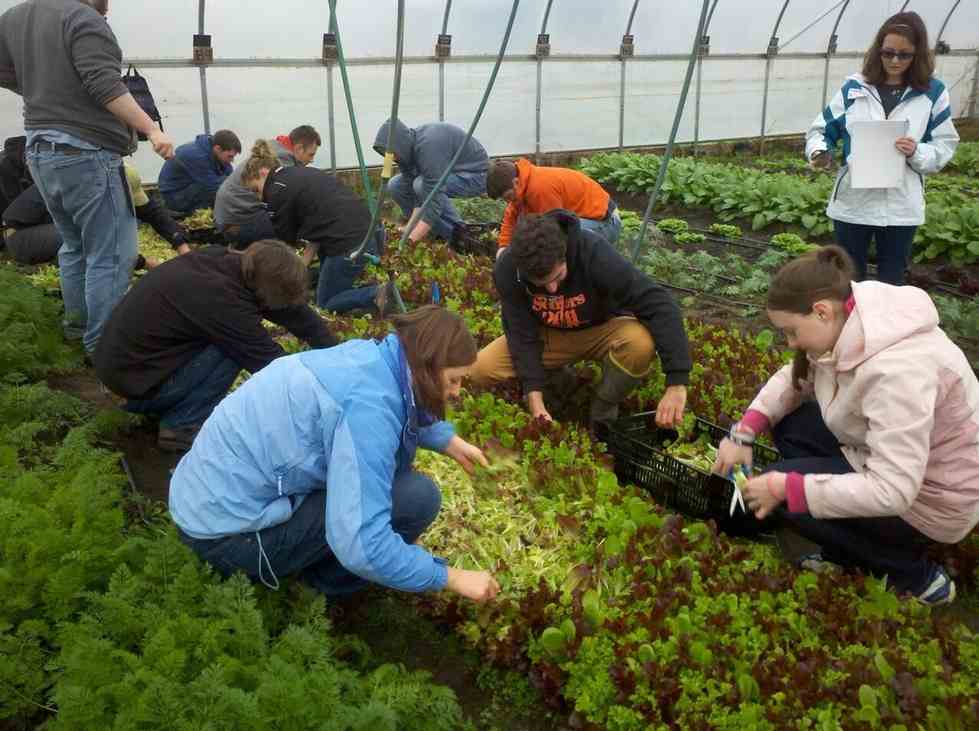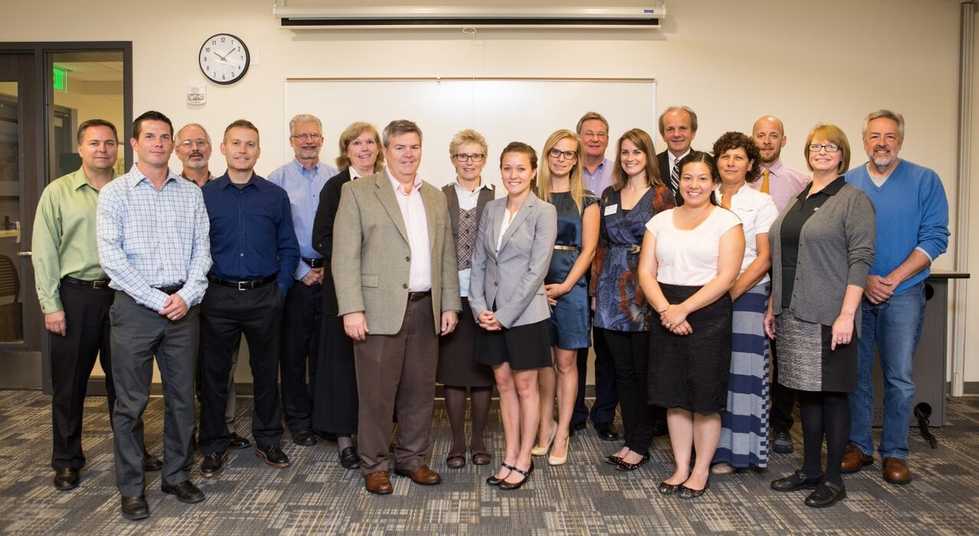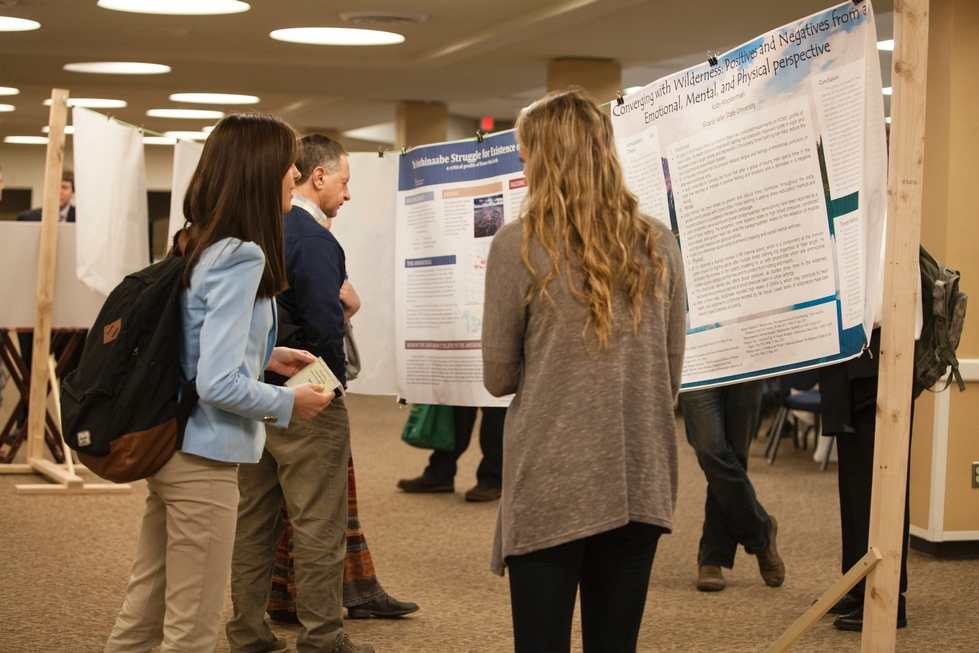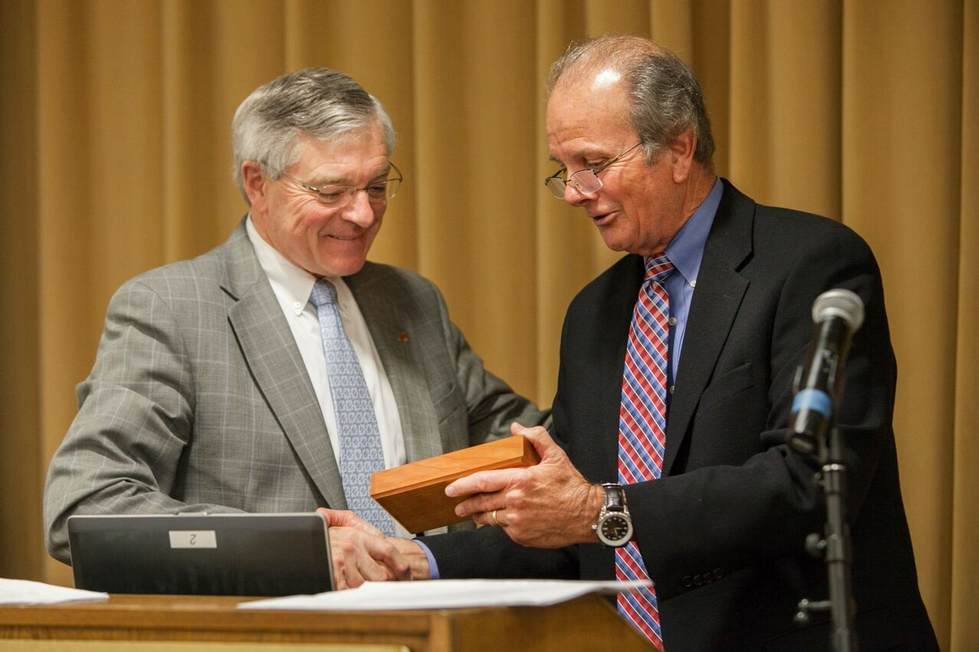Applying Sustainable Practices
Environmental Studies Program Launches Certificate in Sustainable Food Systems
A 15-credit program in sustainable food systems, offered by the environmental studies program in Brooks College, launched in the Winter 2015 semester and is open to community members, as well as currently enrolled Grand Valley students. The certificate program draws on courses, faculty members, and other resources available throughout Brooks College: environmental studies courses, Food Matters from liberal studies (see page 7), an honors sequence titled Food for Thought, and the Sustainable Agriculture Project (SAP) — a farming space at the Allendale campus that includes gardens, hoop houses, and a community supported agriculture share program.
Students pursuing this interdisciplinary certificate select a course focused on agriculture and another focused on food and nutrition from a menu of options that include offerings in international food and culture, plant biotechnology, soil science, and sociology and food. Students also complete two integrative, interdisciplinary courses. They begin the program with Introduction to Environmental Studies and Sustainability, which puts sustainable food systems within a larger context. Students complete the certificate by taking Sustainable Agriculture Practicum, which is taught at the SAP site and applies environmental, economic, and social justice principles to farming techniques.
When interviewed about the program by The Grand Rapids Business Journal, Environmental Studies Director and Professor of Philosophy Kelly Parker noted the appeal of the certificate format for current students and community members alike who wish to gain credentials in this growing area of commerce, hospitality, and agriculture: “It is a response to some changes in what our students and potential students really need and what they are looking for,” he said, referencing the certificate’s streamlined design and specific focus.
This summer, students were invited to “get their hands dirty” by taking a selection of courses within the program — either to earn the entire certificate over the summer or to make substantial progress toward an environmental studies minor. Courses like Global Agricultural Sustainability and Environmental Problem-Solving gave students hands-on research opportunities at the SAP and included field trips to community organizations and environmental sites.

New Council Advances Sustainability by Linking University Practices to Academic Programs
A council has been formed that will focus on planning and advancing sustainability as a campus-wide educational goal and value at Grand Valley.
The Campus Sustainability Advisory Council is comprised of 25 faculty and staff members, including representatives from all eight colleges and a wide variety of units and divisions. Jim Bachmeier, vice president for finance and administration, and Norman Christopher, executive director of the Office of Sustainability Practices, serve as co-chairs. The group, formerly called the Sustainability Advisory Board, was reconstructed in Fall 2015 to include broader campus representation, include more faculty members, and coordinate planning and programming related to sustainability.
“Our goal is to move sustainability at Grand Valley more deeply into academia,” said Bachmeier. “We’ve done an incredible job at being environmentally sustainable through recycling, composting, and energy-saving efforts, but it’s now time to look at how sustainability is integrated into all facets of campus.”
“Sustainability at Grand Valley is progressing at such a rapid pace, so this council will help to continue best practices and identify our next steps,” said Christopher.
The council was formed in the same semester that the Office of Sustainability Practices, formerly the Sustainable Community Development Initiative, announced its name change. Anne Hiskes, dean of the Brooks College of Interdisciplinary Studies, said the name change and formation of the new council is part of a comprehensive plan to strengthen and broaden Grand Valley’s achievements in the areas of triple-bottom line sustainability.
“Going from an initiative to an office was a natural evolution,” Hiskes said. “We plan to better integrate sustainability programming with curriculum and enhance high-impact learning opportunities for students. We are excited about the potential of the office to engage the campus community in a discussion of sustainability-related goals.”

Farm to Table: Produce Grown at GVSU Now Served on Campus
Students and faculty and staff members at Grand Valley are adding a Laker flavor to the farm-to-table concept. In a new partnership between the Office of Sustainability Practices and Campus Dining, produce grown on campus is now being incorporated into meals served on campus.
Herbs and vegetables are grown, harvested, and packaged at Grand Valley’s Sustainable Agriculture Project (SAP), a hands-on farming space that allows students and faculty and staff members to learn about sustainable agriculture. Then, the produce is purchased, prepared, and served at Engrained, a campus restaurant located in The Connection on the Allendale Campus.
“The produce is grown less than a few miles from the restaurant where it’s being prepared and served,” said Dave Feenstra, farm manager for the Sustainable Agriculture Project. “It’s a beneficial collaboration that exposes students to where food comes from.”
Before the produce could be sold and served, a food risk safety assessment through the Michigan Department of Agriculture and Rural Development had to be completed. The assessment included inspections of equipment and procedures at the SAP. Feenstra said students and staff members who harvest the produce completed an extensive training program to learn about food safety.
Aaron Johnson, food services director for The Connection and sustainability manager for Campus Dining, said the collaboration began about two years ago. “The partnership aligns with Grand Valley’s commitment to sustainability. It fosters education and community engagement among members of the campus community,” he said.
Housed in the Brooks College, the SAP was established in 2008 and includes two hoop houses used for fall and winter vegetable production and a community supported agriculture program (CSA). Support is provided by Farm Club members, the Office of Sustainability Practices, an advisory board of faculty and staff members, and a team of student interns.
[1438271728].jpg)
Sustainability Leaders Celebrated, Students from Brooks College Courses Share Sustainability Scholarship at Daylong Event
Leaders and innovators of sustainable practices around economic, environmental, and social justice impact were honored on Sustainability Day, held April 10, 2015.
The seventh annual Grand Valley Sustainability Champions Awards Breakfast kicked off a day of student-led conversation and learning around the topic of sustainability.
At the breakfast, Grand Rapids Mayor George Heartwell received the Legacy Award, a new award that was presented on behalf of the West Michigan community and the Grand Rapids Community Sustainability Partnership (CSP), a network of more than 200 organizations committed to sustainability practices. Thirty-two students and faculty, staff, and community members were recognized as Sustainability Champions for their efforts and impact.
“Mayor Heartwell has played a big role in bringing the sustainability community together in West Michigan,” said Norman Christopher, executive director of the Grand Valley Office of Sustainability Practices. “He helped establish the CSP, and set sustainability goals for the City of Grand Rapids so we can live in a better place today and tomorrow.”
Four recipients of Grand Valley’s Nichols Sustainability Scholarship were recognized for their commitment to making a difference in environmental, social, and fiscal sustainability. The scholarship fund was established in 2006 by Nichols, a Muskegon-based company that distributes products to clean and protect the Great Lakes region. This year’s Nichols scholarship recipients were:
- Brenna Christopoulos, French and education major
- Hannah Fernando, liberal studies major and environmental studies minor
- Emily Johnson, natural resources management major
- Sarah Waraniak, exercise science major
Throughout the rest of the day, students from a number of Brooks College courses presented their sustainability oriented scholarship in oral and poster presentations. Students’ topics ranged from solutions to healthy eating in college and the childhood obesity epidemic to methods of improving irrigation at the campus Sustainable Agriculture Project. Other students pitched environmentally beneficial products and services they had designed by studying social product innovation, such as an electricity-generating playground or new recycling methods.
Courses from which students presented their work include:
- LIB 322: Wicked Problems of Sustainability (Instructor Danielle Lake, assistant professor of liberal studies)
- HNR 280: Food for Thought (Instructors Amy McFarland, assistant professor of environmental studies and a Meijer Honors College faculty member and Kelly Parker, professor of philosophy and director of environmental studies)
- ENS 401: Environmental Problem Solving (Instructor Kelly Parker)
- HNR 280: Social Product Innovation (Instructors Nancy O’Neill of the Meijer Honors College and Professor of Marketing Paul Lane)
The day ended with the student Beekeepers Club presenting on the topic of Pollinator Awareness at the Sustainable Agriculture Project site.


